After John Carpenter’s seminal low-budget horror masterpiece Halloween became one of the biggest sleeper hits of the 1970s, multiplexes were flooded with movies about masked killers targeting teenagers. Throughout the ‘80s, a succession of cliché-ridden duds – Blood Lake, Final Exam, April Fool’s Day – gave the slasher genre a framework of rigidly defined tropes and archetypes. By the time the ‘90s rolled around, the slasher had seemingly lost its ability to surprise audiences.
And then, Wes Craven directed Scream, a sharp meta deconstruction of slashers that revitalized the genre by ridiculing its well-worn formula. Telling the familiar story of a masked serial killer picking off high schoolers, Scream offered an affectionate parody of its peers that still holds up today.
RELATED: How Edgar Wright's Cornetto Trilogy Uses Foreshadowing
What makes Scream the ultimate satire of horror movies is that the characters in its universe are aware of horror movies. The killers draw inspiration from famous slasher villains like Psycho’s Norman Bates and the protagonists are familiar with the kind of horror movie they’re in. While iconic slasher villains like Michael Myers and Leatherface are motivated purely by their bloodlust, the killers in Scream want to live out their favorite horror movies.
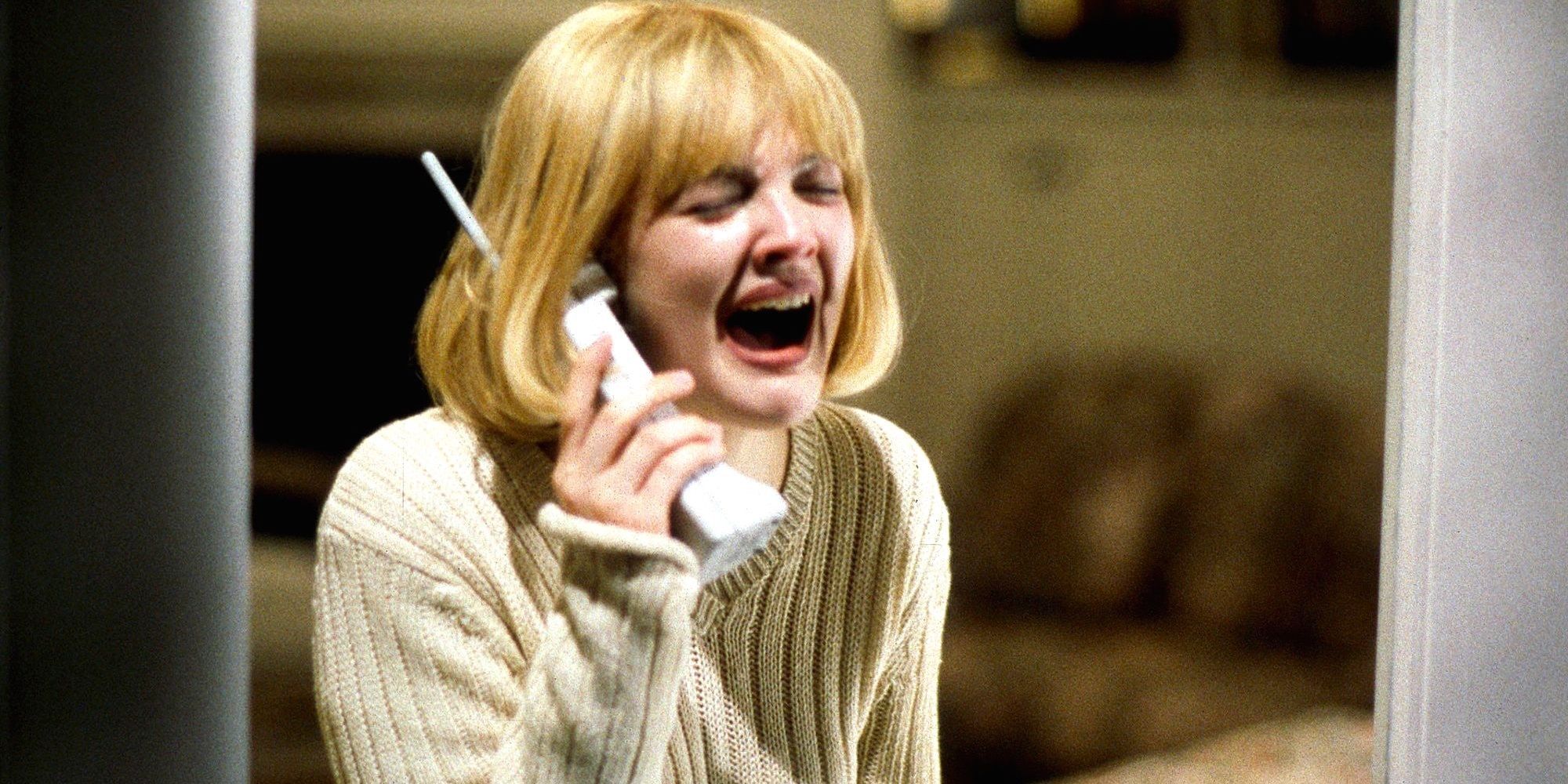
Edgar Wright’s Hot Fuzz did for action movies what Scream had previously done for slashers. Hot Fuzz spoofs the “buddy cop” subgenre of action cinema with the story of a big-city cop being transferred to a small town where he’s mismatched with a bumbling, incompetent detective. The bumbling, incompetent one – Danny Butterman, played by Nick Frost – is a huge fan of action movies.
Action cinema’s exciting but decidedly unrealistic portrayal of police work is what made Danny want to become a cop, and the lack of gun-toting John McClane-style action in his day-to-day life is a source of disappointment. Danny’s awareness of the tropes of action movies and his constant references to them point out the artifice of the genre, just like the characters in Scream.
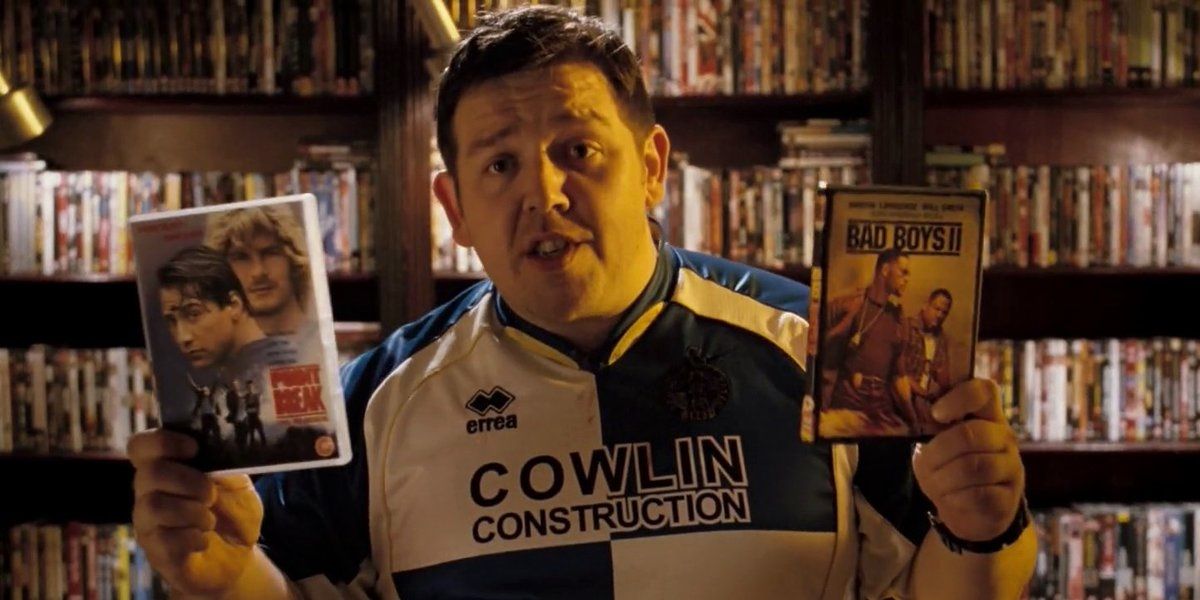
“Do you like scary movies?” Scream establishes itself as a self-aware jab at horror movies in its iconic opening scene. The killer forces Casey to defend her life by answering horror movie trivia questions (in an homage to When a Stranger Calls, no less) and catches her out when she says the killer in Friday the 13th is Jason Voorhees. Jason is the villain in all the sequels, but his mother Pamela was the killer in the first one.
Hot Fuzz’s Danny Butterman is a lot like Scream’s Randy Meeks, played by Jamie Kennedy. While all the high schoolers in Scream have seen a bunch of horror movies, Randy is a particularly obsessive cinephile. Like Danny, he’s the resident genre aficionado. In the party scene, he outlines the rules for surviving a horror movie – namely, don’t have sex or do drugs. Randy’s enthusiasm about being in the midst of a horror movie-style serial killer is comparable to Danny’s enthusiasm whenever he’s thrust into an action sequence. After the shortest car chase in film history, an ecstatic Danny says, “That... was... brilliant.”
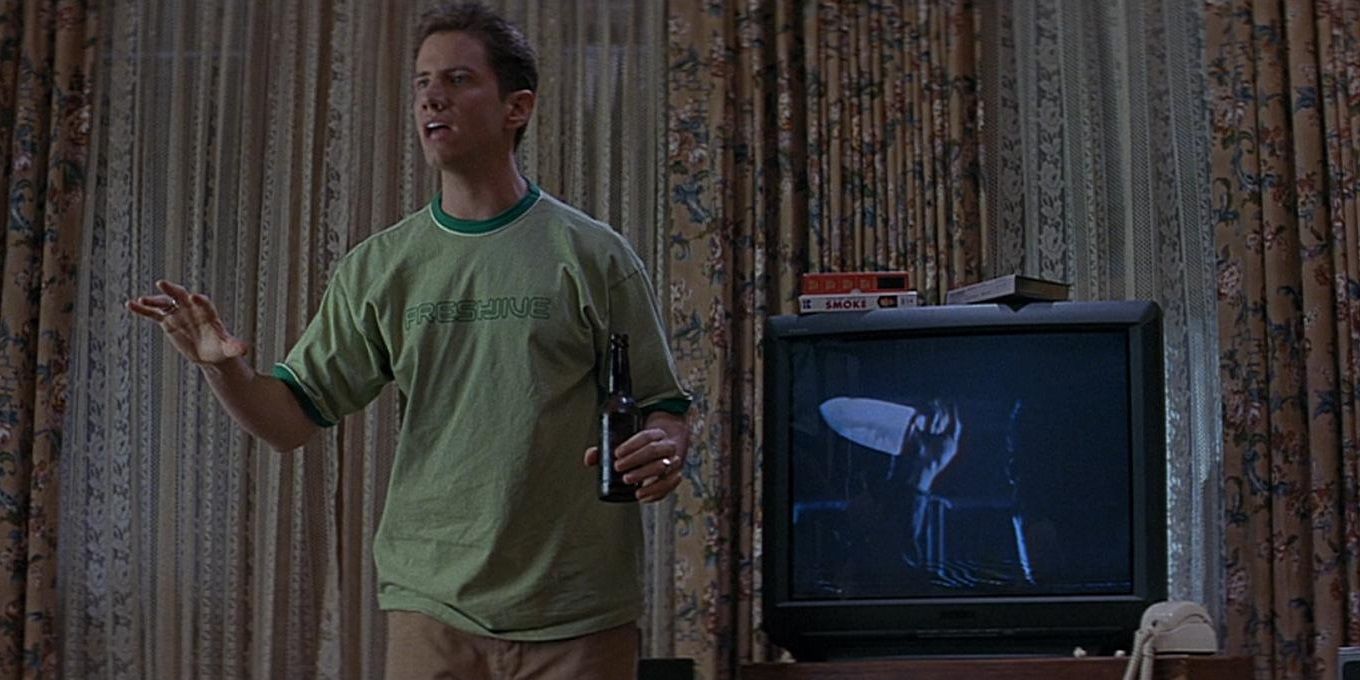
When Nicholas is first paired up with Danny, he starts rattling off the names of action movies. Danny names every conceivable action classic – Die Hard, Lethal Weapon, Dirty Harry – and Nicholas hasn’t seen a single one. When he says he hasn’t seen Bad Boys II, Danny stops in his tracks and says, “You ain’t seen Bad Boys II?” Nicholas’ idea of law enforcement is at odds with Danny’s. Whereas Nicholas wants to solve cases by the book and serve justice with as little drama and violence as possible, Danny wants to be involved in “gunfights, car chases – proper action and s***!” Nicholas hilariously counters, “Police work is not about proper action. Or s***!”
Based on one of the most memorable scenes in Point Break, Danny asks the more seasoned Nicholas, “Have you ever fired your gun up in the air and gone, ‘Ahhh’?” Danny explains the emotional significance of Johnny Utah sparing Bodhi’s life in the Keanu Reeves/Patrick Swayze cult classic, and later does the same thing when his villainous dad is fleeing from the model village. Moments like this highlight the phoniness of the emotional scenes in action movies.
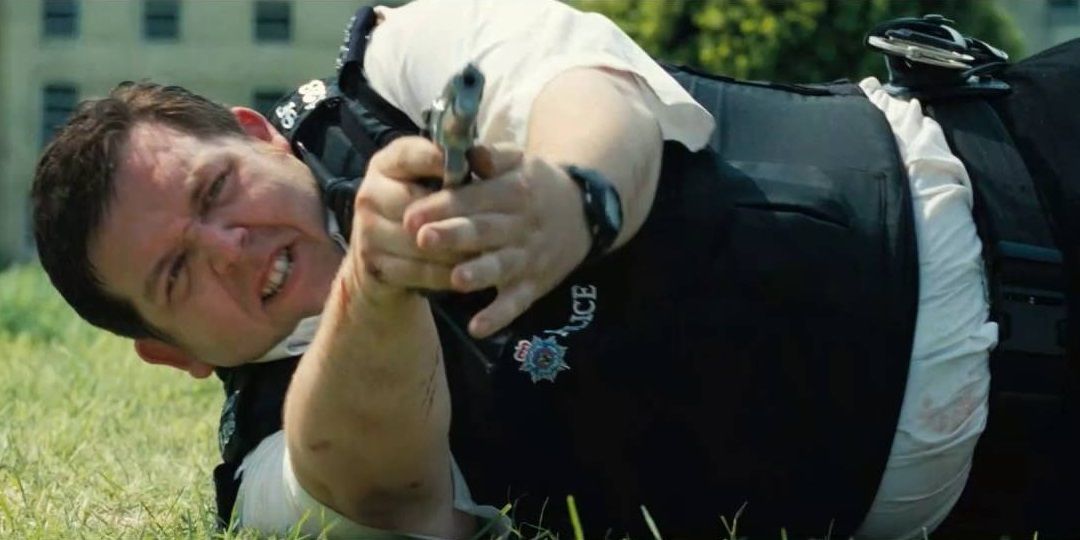
Just as Scream references just about every horror movie under the sun – Psycho, Carrie, Halloween, Friday the 13th, When a Stranger Calls, the list goes on – Hot Fuzz has references to countless classic action movies. The birth announcement of twins named Martin and Roger is a nod to the lead duo in Lethal Weapon. Nicholas’ headlights illuminating the road to justice are a nod to Max’s drive to his final vengeful rampage in Mad Max. Danny dryly reads the DVD blurb of the third Police Story movie starring Jackie Chan: “Supercop. Meet the cop that can’t be stopped.”
Eventually, Danny brings Nicholas around to his cinephilic way of thinking. When Nicholas blows the Sandford conspiracy wide open, he quotes Danny’s favorite movie, Bad Boys II: “This s*** just got real!” In the action-packed finale, Nicholas acknowledges that sometimes Bayhem is the best crimefighting strategy and teams up with Danny to shoot up the Neighborhood Watch Alliance in an extravagant display of John Woo-style “gun fu.”
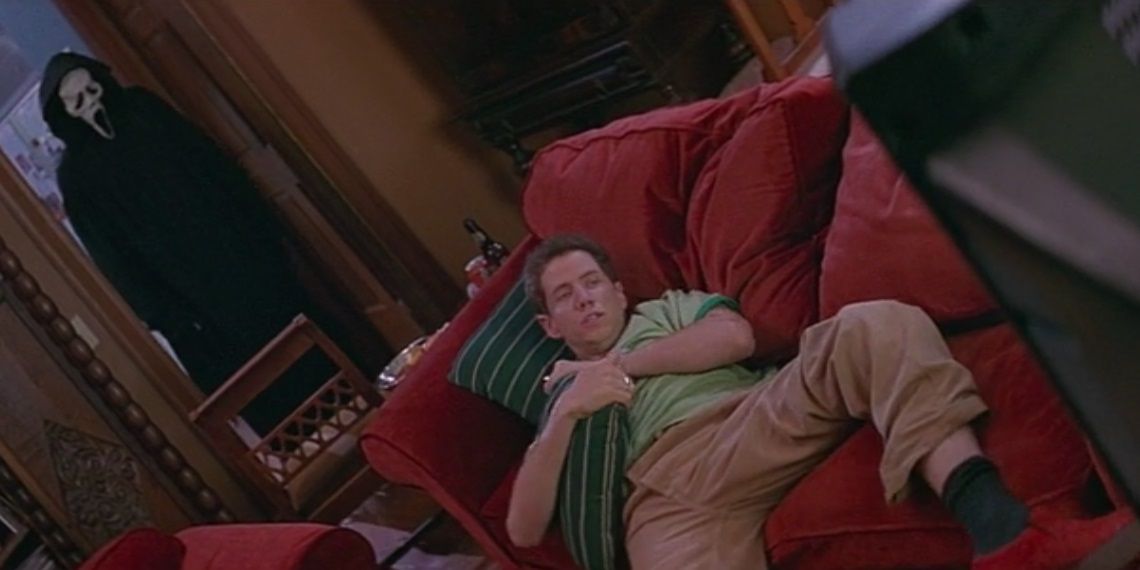
Just as Scream made all subsequent slashers feel redundant, Hot Fuzz made all subsequent buddy cop movies feel redundant. The genre has since been spoofed a bunch more times, but never to the same effect as Hot Fuzz. The Other Guys brought a delightfully absurdist slant, but it was more of a satire of the financial crash than a deconstruction of action movies acutely aware of the genre’s classics and their most prominent tropes.
Much like Shaun of the Dead before it, Hot Fuzz isn’t so much a parody of its genre than an homage to it. Hot Fuzz has nothing but love and admiration for movies like Point Break and Bad Boys II, just like Shaun had a respect and appreciation for the zombie-infested classics of George A. Romero. Scream is similarly affectionate to previous slashers. Craven didn’t set out to criticize or delegitimize slashers. In fact, the slasher trend of the ‘80s is what made him a household name with his 1984 hit A Nightmare on Elm Street, the first movie to bring an overtly supernatural bent to Carpenter’s Halloween formula.
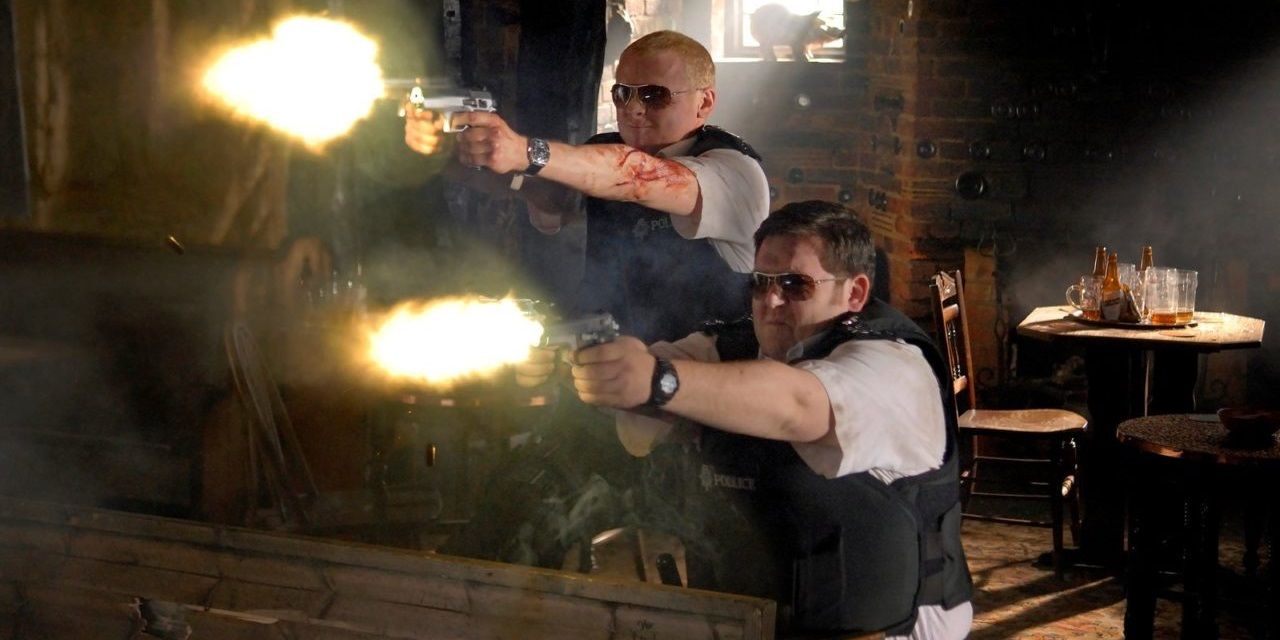
One of the great things about Scream is that, on top of being a meta critique of slashers, it’s also a terrific slasher in its own right. It has plenty of effective jump scares, it has a protagonist who’s easy to root for and villains who are easy to hate, and Kevin Williamson’s script brings a unique whodunit angle to the familiar genre framework. The same can be said of Hot Fuzz. It’s a great comedy and a hilarious takedown of buddy cop movies, but its action is shot and edited with a real kinetic energy.
That’s what sets Hot Fuzz apart from other action comedies like Spy. The humor in Spy works really well, but its action scenes are seriously lacking, with unengaging locked-off camera angles and no real sense of danger. By contrast, the visceral shootouts and fast-paced car chases in Hot Fuzz wouldn’t feel out of place in a Bayhem spectacle or a John Woo “gun fu” extravaganza. Just as Wes Craven brought real terror to his spoof of blood-soaked slashers, Edgar Wright brought real thrills to his spoof of cops-and-crooks actioners.

